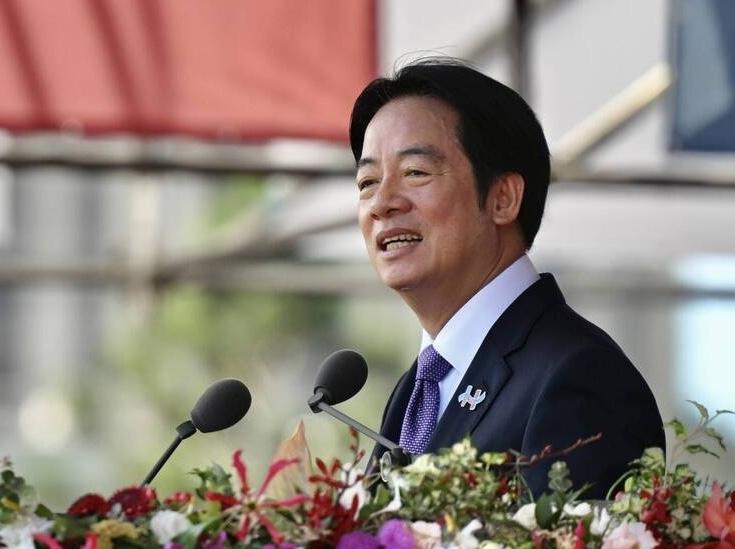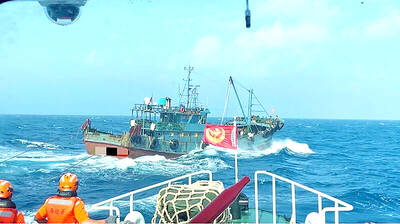President William Lai (賴清德) today announced the government is to propose a special national defense budget by the end of this year that includes funds for a “T-Dome” air defense system in his keynote Double Ten National Day speech.
Taiwan’s defense spending is to exceed 3 percent of GDP next year and reach 5 percent by 2030 to show its determination to safeguard the nation, Lai said.
The increase in defense spending is to counter enemy threats and would be a driving force for developing the nation's defense industry, he said

Photo: Lo Pei-de, Taipei Times
The new budget aims to achieve three major goals, he said.
The first would be to accelerate the building of a “T-Dome” rigorous air defense system in Taiwan with multi-layer defense, high-level detection and effective interception, he said.
Second, the government intends to continue the integration of high-tech and artificial intelligence technologies to build a "smart" defense combat system, maximizing effective deterrence for Taiwan’s asymmetric strategy, he said.
Third, the government is to invest in innovative defense technologies and collaborate with the defense industries of advanced nations to bolster Taiwan’s defense capabilities, he said.
Taiwan is to strengthen its domestic supply chain through local research and development, design and manufacturing, he added.
This would enable Taiwan to accelerate industry upgrades, enhance the resilience of its military equipment and boost the capacity of its military industries, he said.
Taiwan would become a trusted partner of its friends and allies to jointly avoid the “red supply chain” and foster trust in defense among free and democratic countries, while building a robust line of defense to safeguard the values of freedom and democracy, he said.
“We are determined to maintain peace through strength,” he said.
In his speech, Lai urged the world not to forget the lessons of World War II, as this year marks the 80th anniversary of the end of war.
Authoritarianism continues to expand and the international order faces severe challenges, he said.
Regional order in the Taiwan Strait, the East Sea, the South China Sea and the security of the entire first island chain are under serious threat, he said.
Democratic Taiwan is a crucial link for the peace and stability of the Indo-Pacific region and is a responsible member of the international community, he said.
As such, Taiwan is to work to uphold the “status quo,” ensure peace and stability of the Taiwan Strait and promote prosperous development of the region, he said.
“We look forward to the day when China takes responsibility as a major power and ceases distortion of the UN Resolution 2758 and historical World War II documents,” he said.
He said he hopes China would renounce the use of force or coercion to change the “status quo” across the Taiwan Strait, so that both sides can jointly maintain regional peace and stability.
“We should learn from the lessons of World War II and ensure the tragedies of history are never repeated,” he said. “The outcomes of that conflict tell us that aggression fails, unity prevails."
Lai also noted that this year is a historic year for Taiwan’s democratization.
As of Sept. 10, the number of days Taiwan has spent free from martial law officially surpassed the number of days endured under its stifling rule, he said.
This signifies that Taiwan has parted entirely from the shadow of an authoritarian regime and has ushered in a democratic future full of hope, he said.
“We will not forget the blood and tears of those who united to defend against aggression, nor will we forget the sacrifices of past generations in pursuit of democracy and freedom, returning sovereignty to the people,” he said.
Taiwan is a beacon of democracy in Asia for everyone who is living in the darkness of authoritarian rule, he said.

The Republic of China (ROC) is celebrating its 114th Double Ten National Day today, featuring military parades and a variety of performances and speeches in front of the Presidential Office in Taipei. The Taiwan Taiko Association opened the celebrations with a 100-drummer performance, including young percussionists. As per tradition, an air force Mirage 2000 fighter jet flew over the Presidential Office as a part of the performance. The Honor Guards of the ROC and its marching band also heralded in a military parade. Students from Taichung's Shin Min High School then followed with a colorful performance using floral imagery to represent Taiwan's alternate name

COGNITIVE WARFARE: Chinese fishing boats transmitting fake identification signals are meant to test Taiwan’s responses to different kinds of perceived incursions, a report said Chinese vessels are transmitting fake signals in Taiwan’s waters as a form of cognitive warfare, testing Taipei’s responses to various types of incursions, a report by the Institute for the Study of War said on Friday. Several Chinese fishing vessels transmitted fake automatic identification system (AIS) signals in Taiwan’s waters last month, with one mimicking a Russian warship and another impersonating a Chinese law enforcement vessel, the report said. Citing data from Starboard Maritime Intelligence, the report said that throughout August and last month, the Chinese fishing boat Minshiyu 06718 (閩獅漁06718) sailed through the Taiwan Strait while intermittently transmitting its own AIS

CHINESE INFILTRATION: Medical logistics is a lifeline during wartime and the reported CCP links of a major logistics company present a national security threat, an expert said The government would bolster its security check system to prevent China from infiltrating the nation’s medical cold chain, a national security official said yesterday. The official, who wished to stay anonymous, made the remarks after the Chinese-language magazine Mirror Media (鏡周刊) reported that Pharma Logistics (嘉里醫藥物流) is in charge of the medical logistics of about half of the nation’s major hospitals, including National Taiwan University Hospital and Taipei Veterans General Hospital. The company’s parent, Kerry TJ Logistics Co (嘉里大榮物流), is associated with the National Committee of the Chinese People’s Political Consultative Conference (CPPCC) and the Chinese People’s Liberation Army (PLA), the

COVETED PRIZE: The US president would be a peace prize laureate should he persuade Xi Jinping to abandon military aggression against Taiwan, William Lai said US President Donald Trump should get the Nobel Peace Prize should he be able to convince Chinese President Xi Jinping (習近平) to abandon the use of force against Taiwan, President William Lai (賴清德) told a conservative US radio show and podcast in an interview. The US is Taiwan’s most important international backer, despite the absence of formal ties, but since Trump took office earlier this year he has not announced any new arms sales to the nation. Trump could meet Xi at the APEC summit in South Korea on Oct. 31 and Nov. 1. Lai, speaking on The Clay Travis and Buck Sexton